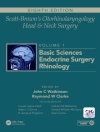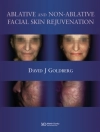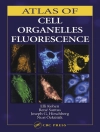This text presents the experiences of leading researchers and surgeons with different fluorescence methods. Chapters range from basic science of fluorescence to current clinical applications and new horizons. The first few chapters describe the historical evolution and physical principles of fluorescence and provide the foundation for the reader to understand the current scope and limits of its use in surgery. The second section focuses on the clinical applications of intraoperative fluorescence imaging including subsections on fluorescence cholangiography, applications to hepatectomy, lymph node navigation, applications to GI tract and pelvic surgery and identification of cancer tissues. The third section focuses on new frontiers including fluorescence probes, imaging systems and applications to photodynamic therapy.
Authored by leaders in the development of fluorescent methods worldwide, Fluorescence Imaging for Surgeons: Concepts and Applications will have an impact on numerous medical specialists including general surgeons, colorectal and minimally-invasive surgeons and surgical oncologists. Researchers will find the book to be an invaluable resource on the latest advances in the utilization of nanoparticles and fluorescent probes.
Tabella dei contenuti
Section I: Background.- Basic Concepts of Fluorescence and Fluorescent Probes.- Past, Present, and Future of Fluorescence.- Translation of Therapeutic Antibodies for Intraoperative Fluorescence Imaging.- Review of Indocyanine Green Imaging in Surgery.- Section II: Imaging Systems.- D-Light P System (Karl Storz) (with video).- Robotic Surgery Using Firefly System.- Fluorescence Imaging Systems (PDE, Hyper Eye Medical System, and Prototypes in Japan).- The Pinpoint System.- Economic Impact of Fluorescent Cholangiography.- Real-time Near-Infrared Fluorescent Cholangiography During Robotic Single-Site Cholecystectomy.- Fluorescent Guided Liver Surgery: Paul Brousse Experiences and Perspective.- Fluorescence Imaging in Laparoscopic Hepatectomy (with video).- Section III: Clinical Applications of Intraoperative Fluorescence Imaging.- Identification of Hepatic Segment (with video).- Intraoperative Evaluation of Regional Portal Uptake Function (with video).- Identification of Hepatocellular Carcinoma (with video).- Identification of Metastatic Liver Cancer (with video).- Prediction for Postoperative Intrahepatic Recurrence of Hepatocellular Carcinoma.- Detection of Bile Leakage after Hepatic Resection by Intraoperative Indocyanine Gren Flourescent Imaging.- Near-Infrared Laser Photodynamic Therapy for Human Hepatocellular Carcinoma Cell Line Tumor with Indocyanine Green Fluorescene.- Photodynamic Diagnosis of Gastric Cancer Using 5-Aminolevulinic Acid (with video).- Applications of ICG Fluorescence Imaging for Surgery in Colorectal Cancer.- Fluorophore-Conjugated Chimeric Anti-CEA Antibodies for Fluorescence-Guided Surgery of Gastrointestinal (GI) Tumors.- Development of a Non-Blurring, Dual-Imaging (X-ray/Fluorescence) Tissue Marker for Localization of Gastrointestinal Tumors.- Sentinel Node Navigation Surgery by Infrared Imaging in Gastric Cancer.- A Dual Infrared Ray Imaging System for Sentinel Node Mapping Against Early Gastric Cancer: Absorption and Florescence Methods by Infrared Ray Electronic Endoscopy Combined with Indocyanine Green.- Indocyanine Green Fluorescence-Navigated Sentital Node Biopsy Showed Higher Sensitivity than the Conventional Radioisotope or Blue Dye Methods: It May Help to Reduce False-Negative Sentinel Lymph Node Biopsies in Skin Cancer.- The Indocyanine Green Method is Equivalent to ther (99m) Tc-Labeled Radiotracer Method for Identifying the Sentinel Node in Breast Cancer: A Concordance and Validation Study.- Photodynamic Detection of Lymph Node Metastases in Gastronintestinal Cancer by Using 5-Aminolevulinic Acid.- Application of Photodynamic Treatment (with video).- Photodynamic Diagnosis Mediated by 5-Aminolevulinic Acid for Urinary Bladder Cancer (with video).- Real-time Assessment of Intestinal Perfusion by Fluorescence-Based Enhanced Reality.- Fluorescent Angiography for Flap Planning and Monitoring in Reconstructive Surgery.- Fluorescein-Detection of Myocardial Ischemia in an Experimental Model of Acute Coronary Occlusion.- Spatial and Temporal Monitoring of Perfusing with Indocyanine Green Videoangiography in Rat Heart.- Ureter Identification Using Methylene Blue and Fluorescein.- Chymotrypsin Probe for Real-Time Visualization of Pancreatic Leak.
Circa l’autore
Fernando Dip, MD, MAAC
The Bariatric and Metabolic Institute
Section of Minimally Invasive Surgery
Department of General and Vascular Surgery
Cleveland Clinic Florida
Weston, FL
USA
And
Oncological Surgical Division, Department of Surgery
Division of Surgical Research
Hospital de Clinicas Buenos Aires
University of Buenos Aires
Buenos Aires, Argentina
Takeaki Ishizawa, MD, Ph D, FACS
Department of Gastroenterological Surgery, Cancer Institute Hospital
Japanese Foundation for Cancer Reserach
Koto-ku, Tokyo
Japan
And
Hepato-Biliary-Pancreatic Surgery Division, Department of Surgery
Graduate School of Medicine, The University of Tokyo
Bunkyo-ky, Tokya
Japan
Norihiro Kokudo, MD, Ph D, FACS
Professor and Chairman
Hepato-Biliary-Pancreatic Surgery Division, Department of Surgery
Graduate School of Medicine, The University of Tokyo
Bunkyo-ky, Tokya
Japan
Raul J. Rosenthal, MD, FACS
Chief of Staff
The Bariatric & Metabolic Institute
Section of Minimally Invasive Surgery
Department of General & Vascular Surgery
Cleveland Clinic Florida
Weston, FL USA












